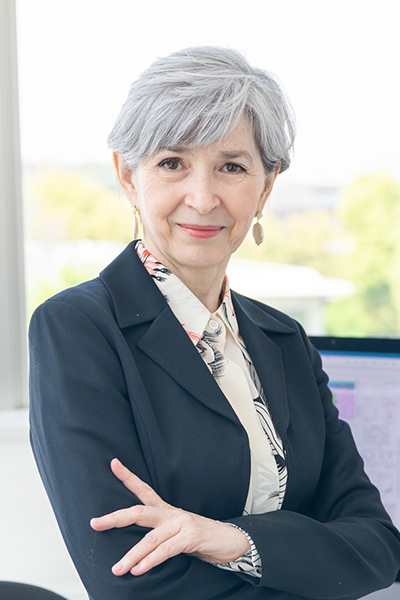Education
- “Iuliu Hatieganu” University of Medicine & Pharmacy, Cluj, Romania. Degree: Medical Doctor.
- Residency & Specialty in Clinical Laboratory, Microbiology, Biochemistry & Hematology, University of Medicine & Pharmacy, Cluj, Romania.
- Monbusho Visiting Researcher, Department of Medical Chemistry, Kyoto University, Faculty of Medicine, Kyoto, Japan.
Professional Experiences
- Team Director, Laboratory for Mucosal Immunity, RIKEN Center for Integrative Medical Sciences (IMS)
- Professor, Division of Integrated High-Order Regulatory Systems, Center for Cancer Immunotherapy and Immunobiology (CCII)
- CCII Vice-Director
Research Focus
Our work on mucosal immunity uncovered an unanticipated role of the immune system in regulating the indigenous microbial communities, mucosal barrier integrity and whole-body homeostasis. We revealed the symbiotic role of IgA, elucidated the cellular and molecular mechanisms of IgA synthesis and demonstrated the instrumental role of adaptive immunity for controlling the development and maintenance of complex gut bacterial communities. We demonstrated the critical role of T cells, and the unique regulatory roles of signaling receptors (ex. PD-1) and transcription factors (ex. Foxp3, Bcl-6) for the IgA synthesis promoting mutualistic relationships with the gut microbiota. We showed that bacterial overgrowth caused by mucosal antibody defects activates peripheral immune system fueling the cycle of systemic activation and autoimmunity.
Recently we applied systems biology approaches to long-range extra-intestinal effects of the microbiota-immune interactions. Combining metabolomics, immunological analysis and mouse behavioral studies, we reveal the impact of chronic systemic immune activation on the brain biochemistry controlling the emotional responses.
We investigate the metabolic adaptations of the immune cells initiated upon antigenic stimulation and focus on secreted immune cell metabolites (SIMets) as essential components of immune communication networks, fine-tuning the immune responses.
Achieving a better understanding of the fundamental biology behind checkpoint inhibitors in human cancer models will help us to build better therapy regimes, and enhance the efficiency and effectivity of cancer immunotherapy.
Honors & Awards
- 2005: Young Scientist Award from the Ministry of Education, Culture, Sport, Science & Technology (MEXT), Japan
- 2012: Achievements Award from the Japanese Society for Immunology
- 2013: NISTEP Award from the Ministry of Education, Culture, Sport, Science & Technology (MEXT), Japan
- 2020: 1st Kobayashi Award
Selected Publications
Chamoto K, Zhang B, Tajima M, Honjo T, Fagarasan S. Spermidine – an old molecule with a new age-defying immune function. (2023) Trends Cell Biol. S0962-8924(23)00166-6. DOI: https://doi.org/10.1016/j.tcb.2023.08.002
Muna Al-Habsi, Kenji Chamoto, Ken Matsumoto, Norimichi Nomura, Baihao Zhang, Yuki Sugiura, Kazuhiro Sonomura, Aprilia Maharani, Yuka Nakajima, Yibo Wu, Yayoi Nomura, Rosemary Menzies, Masaki Tajima, Koji Kitaoka, Yasuharu Haku, Sara Delghandi, Keiko Yurimoto, Fumihiko Matsuda, So Iwata, Toshihiko Ogura, Sidonia Fagarasan, Tasuku Honjo. Spermidine activates mitochondrial trifunctional protein & improves antitumor immunity in mice, Science 378(6618) eabj3510 Oct 28, (2022). DOI: https://www.science.org/doi/10.1126/science.abj3510
Zhang, B., Vogelzang, A., Miyajima, M., Sugiura, Y., Wu, Y., Chamoto, K., Nakano, R., Hatae, R., Menzies, R.J., Sonomura, K., Hojo, N., Ogawa, T., Kobayashi, W., Tsutsui, Y., Yamamoto, S., Maruya, M., Narushima, S., Suzuki, K., Sugiya, H., Murakami, K., Hashimoto, M., Ueno, H., Kobayashi, T., Ito, K., Hirano, T., Shiroguchi, K., Matsuda, F., Suematsu, M., Honjo, T., Fagarasan, S. Bcell-derived GABA elicits IL-10+ macrophages to limit anti-tumour immunity. Nature 599, 471-476 (2021). DOI: https://doi.org/10.1038/s41586-021-04082-1
Miyajima, M., Zhang, B., Sugiura, Y., Sonomura, K., Guerrini, M.M., Tsutsui, Y., Maruya, M., Vogelzang, A., Chamoto, K., Honda, K., Hikida, T., Qin, H., Sanuki, R., Suzuki, K., Furukawa, T., Ishihama, Y., Matsuda, F., Suematsu, M., Honjo, T., Fagarasan, S. Metabolic shift induced by systemic activation of T cells in PD-1 deficient mice perturbs brain monoamines & emotional behavior. Nat Immunol. 18, 1342-1352 (2017). DOI: doi.org/10.1038/ni.3867
Chamoto, K., Chowdhury, PS, Kumar, A., Sonomura, K., Matsuda, F., Fagarasan, S., Honjo, T. Mitochondrial activation chemicals synergize with surface receptor PD-1 blockade for T cell-dependent antitumor activity. Proc Natl Acad Sci U S A. 114(5):E761-E770 (2017). DOI: https://www.pnas.org/doi/full/10.1073/pnas.1620433114
Kawamoto, S., Maruya, M., Kato, LM., Suda, W., Atarashi, K., Doi, Y., Tsutsui, Y., Qin, H., Honda, K., Okada, T., Hattori, M., Fagarasan, S. Foxp3(+) T cells regulate immunoglobulin a selection & facilitate diversification of bacterial species responsible for immune homeostasis. Immunity. 2014 Jul 17;41(1):152-65. DOI: 10.1016/j.immuni.2014.05.016
Kawamoto, S., Tran, TH., Maruya, M., Suzuki, K., Doi, Y., Yumi, T., Kato, ML., Fagarasan, S. The inhibitory receptor PD-1 regulates IgA selection & bacterial composition in the gut. Science 2012, 336(6080):485-9. DOI: 10.1126/science.1217718
Tsuji, M., Komatsu, N., Kawamoto, S., Suzuki, K., Kanagawa, O., Honjo, T., Hori, S., Fagarasan, S. Preferential generation of follicular B helper T (TFH) cells from Foxp3+ T cells in gut Peyer’s patches. Science, 2009, 323, 1488-1492. DOI: https://10.1126/science.1169152
Tsuji, M., Suzuki, K., Kitamura, H., Maruya, M., Kinoshita, K., Ivaylo, II., Itoh, K., Littman, DR., Fagarasan, S. Requirement for Lymphoid tissue-inducer cells in isolated follicle formation and T cell-independent immunoglobulin A generation in the gut. Immunity. 2008 Aug 15;29(2):261-71. DOI: https://10.1016/j.immuni.2008.05.014
Suzuki, K., Meek, B., Doi, Y., Muramatsu, M., Chiba, T., Honjo, T., Fagarasan, S. Aberrant expansion of segmented filamentous bacteria in IgA-deficient gut. Proc Natl Acad Sci U S A. 2004 Feb 17;101(7):1981-6. DOI: https://www.pnas.org/doi/full/10.1073/pnas.0307317101

